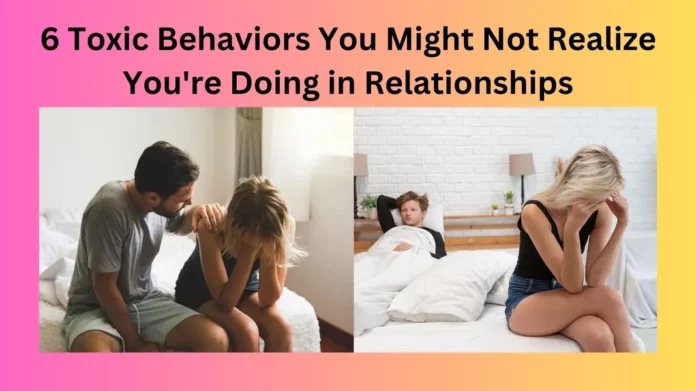Introduction:
In the intricate dance of love and connection, it’s not always easy to see our own missteps. Relationships, be they romantic or platonic, thrive on mutual understanding, respect, and healthy communication. However, there are subtle behaviors that might slip under the radar, poisoning the well of connection without us even realizing it.
In this article, we’ll uncover six toxic behaviors that might be sabotaging your relationships, often going unnoticed. Let’s delve into the depths of these relationship pitfalls and explore ways to break free from their grasp.
1. The Silent Assassin: Emotional Withdrawal
In the realm of toxic behaviors, emotional withdrawal is the stealthy ninja. It creeps in quietly, leaving your partner feeling abandoned and confused. While it’s natural to need personal space, habitual emotional withdrawal can create an emotional void, leading to misunderstandings and distance in your relationship.
Understanding Emotional Withdrawal
Emotional withdrawal often stems from unaddressed emotional issues, stress, or a fear of vulnerability. It’s crucial to recognize the signs and work towards open communication to prevent this behavior from eroding the foundation of your connection.
2. The Blame Game: Shifting Responsibility
Pointing fingers and playing the blame game is a toxic behavior that can poison even the healthiest relationships. Rather than taking responsibility for our actions, we may find ourselves deflecting blame onto our partners, creating an unhealthy cycle of resentment.
Breaking the Cycle
Acknowledging and taking responsibility for our mistakes is the first step towards healthier interactions. Embrace open communication, and focus on finding solutions rather than assigning blame. This simple shift can transform the dynamics of your relationship.
3. The Comparison Trap: Undermining Your Partner
Constantly comparing your partner to others, be it in appearance, achievements, or any other aspect, can breed insecurity and resentment. The comparison trap is a subtle toxic behavior that can erode the self-esteem of your significant other.
Celebrate Uniqueness
Instead of falling into the comparison trap, celebrate your partner’s uniqueness. Express appreciation for their qualities and achievements without juxtaposing them against others. This fosters a positive environment where both partners can thrive.
4. The Communication Breakdown: Stonewalling
Stonewalling, or shutting down emotionally during a disagreement, is a toxic behavior that halts healthy communication in its tracks. It leaves both partners feeling unheard and frustrated, hindering the resolution of issues.
Opening the Channels of Communication
Breaking the pattern of stonewalling requires a commitment to active listening and expressing emotions constructively. Creating a safe space for open dialogue allows for a deeper understanding of each other’s perspectives.
5. The Insecurity Spiral: Excessive Jealousy
Jealousy can be a natural emotion, but when it transforms into excessive possessiveness and control, it becomes toxic. This behavior can suffocate your partner, leading to strained trust and, ultimately, a breakdown in the relationship.
Nurturing Trust
Building trust involves open communication and fostering a sense of security in the relationship. Addressing the root causes of jealousy and practicing transparency can help dispel insecurities and strengthen the foundation of trust.
6. The Ghosting Act: Avoiding Confrontation
Ghosting, the act of suddenly cutting off communication without explanation, is a modern relationship plague. This toxic behavior leaves the other person in the dark, creating confusion and emotional distress.
Choose Clarity Over Silence
Instead of resorting to ghosting, choose clarity. Honest communication, even if it involves difficult conversations, is vital for the health of any relationship. It allows both parties to gain closure and move forward, whether together or separately.
Conclusion:
Navigating the complexities of relationships requires constant self-awareness and a commitment to growth. By recognizing and addressing these six toxic behaviors, you can create a healthier and more fulfilling connection with your partner. Remember, fostering a strong relationship is an ongoing process that thrives on open communication, empathy, and mutual respect.
FAQs:
1. Q: Can toxic behaviors be changed with effort?
A: Absolutely. Recognizing these behaviors is the first step, and with conscious effort and communication, positive changes can be made.
2. Q: How can I break the cycle of emotional withdrawal?
A: Start by identifying the root causes and communicate openly with your partner. Seeking professional help, such as couples therapy, can also be beneficial.
3. Q: Is occasional jealousy normal in a relationship?
A: Yes, but it’s essential to differentiate between healthy and excessive jealousy. Open communication and building trust can help manage jealousy in a relationship.
4. Q: What if my partner doesn’t acknowledge their toxic behavior?
A: Gently express your concerns and encourage open dialogue. If needed, consider seeking the assistance of a relationship counselor to facilitate the conversation.
5. Q: How can I rebuild trust after a bout of excessive jealousy?
A: Rebuilding trust takes time and consistent effort. Be transparent, communicate openly, and demonstrate through actions that you can be trusted.















